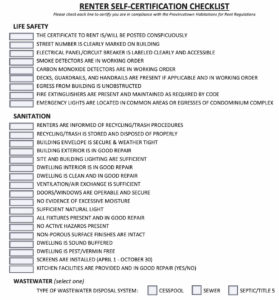PROVINCETOWN — Since 2005 the board of health has required landlords who rent their property year-round, seasonally, or short-term (fewer than 30 days) to have a rental certificate. These certificates specify the number of bedrooms and occupants and document that the rental complies with various safety and health regulations, including adequate fire exits, smoke alarms, and sanitation. About 1,000 active certificates exist.

It’s never been easy for town officials to know which properties are being rented without certificates. Only about a quarter of Provincetown’s 4,300 or so residential units are owner-occupied year-round, according to UMass-Dartmouth’s detailed 2018 study of the town’s housing. The rest are either used exclusively as second homes or they’re rented some of the time. That’s 3,200 units, give or take, and only 1,000 rental certificates. How to know which of those units are actively rented?
Now there’s a way to find at least some of them: the short-term rental tax, also known as the “weekly tax.” It took effect July 1, 2019, and has generated a list of rented properties, which the town will now be using to contact people whose rentals have no certificate.
The rules for these certificates have been created by the health board to comply with state laws. For many years town staff were required to inspect each property to assess occupancy limits and fire safety; that was changed to a discretionary inspection in 2016.
The town switched from a seasonal to a full-time code compliance agent over the winter and gave him a mandate to focus on increasing compliance with rental safety rules. The agent, Aaron Hobart, has good news for those with no rental certificate: it’s not too late to sign up without incurring a penalty.
A Provincetown rental certificate is valid for three years and costs $300, although it’s free for those renting year-round at affordable rates.
“If someone has been renting for five years and they walk up to our window for the first time, we’re going to give them a permit, charge $300, and say thank you,” said Hobart. “We’re also going to be doing proactive enforcement, though. That means looking at the rental websites and at the list of addresses we’re getting from the state’s weekly tax. If you’re found to be renting without the benefit of a rental certificate, you do pay double fees. That would be $600 for three years.
“We don’t enjoy fining people,” Hobart continued. “We’re encouraging people to come in on their own and get their properties certified.”
The rental certificates themselves bring in about $100,000 a year to the town’s balance sheet; that’s a small fraction of the $1 million the expanded weekly tax will probably generate in 2020. Provincetown’s total rooms tax receipts, including hotels and guest houses, could be close to $3 million in 2020.
Hobart will also be helping with some licensing and zoning matters like seat counts in restaurants and TIPS certification for bar staff. “But I’d say the biggest parts of my mandate right now are rentals and rats,” he said. Those are both governed by the health department, and because of that, there’s one other rule citizens should be aware of: anonymous tips.
Unsafe rental conditions, whether year-round, seasonal, or short-term, may be reported anonymously to the health department by tenants, concerned neighbors, or anyone at all. Mishandled garbage that leads to rat infestations can also be reported anonymously.
“We have a general policy not to accept anonymous complaints at town hall, but that’s not the case for matters of health or public welfare,” said Hobart. “If someone has a concern about safety, they can report that anonymously to the health department or to me, and we can respond.” Hobart can be reached by calling (508) 487-7000 extension 580 or emailing
[email protected].



